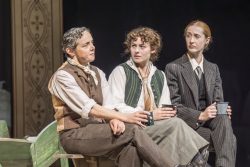 THE first performances of David Hare’s new play Grace Pervades offer a unique opportunity to theatre lovers – to sit in one of the country’s most beautiful theatres learning fascinating facts about Victorian theatre legends Henry Irving and Ellen Terry, from a stage on which they actually performed. And, for these days of breathless star-struckery, you can throw in screen great and late He Who Shall Not Be Named Ralph Fiennes into the bargain.
THE first performances of David Hare’s new play Grace Pervades offer a unique opportunity to theatre lovers – to sit in one of the country’s most beautiful theatres learning fascinating facts about Victorian theatre legends Henry Irving and Ellen Terry, from a stage on which they actually performed. And, for these days of breathless star-struckery, you can throw in screen great and late He Who Shall Not Be Named Ralph Fiennes into the bargain.
As with all Hare’s plays, you need to pay attention. The story he tells is packed with fascinating detail, not just following the lives of Irving (born in Keinton Mandeville as John Henry Brodribb) and single mother Terry, but of her children, the trials and tribulations of running a theatre company in London and on tour and how the starry stage partners transformed public attitudes to the theatre on both sides of the Atlantic.
 The 13-strong company takes the audience from London theatres and fashionable cafes to Sussex barns and gardens, memory-stuffed dressing rooms, provincial hotel rooms and European mountain villages. Bob Crowley has designed versatile sets, with stunning use of video and lighting, creating these journeys before our eyes. Perhaps the rather noisy and clunky “Russian” sets need a rethink.
The 13-strong company takes the audience from London theatres and fashionable cafes to Sussex barns and gardens, memory-stuffed dressing rooms, provincial hotel rooms and European mountain villages. Bob Crowley has designed versatile sets, with stunning use of video and lighting, creating these journeys before our eyes. Perhaps the rather noisy and clunky “Russian” sets need a rethink.
The child of actors, Ellen Terry had two children, Edward Gordon and Edith, by her married architect and designer lover. The children were given the surname Craig to avoid the stain of illegitimacy. Edward Gordon Craig was what we now call a narcissist, obsessed with his own genius. He managed to create an aura of celebrity – perhaps an early model for being famous for being famous. His ideas for radical changes to theatre were not only peculiar but often incomprehensible – but apparently he influenced Peter Brook, and we know what that meant.
 Edith (aka Edy) was also involved in all aspects of theatrical life, but on a more realistic scale, founding a company to perform in a barn at her mother’s home, and living in a famous menage a trois with a playwright and an artist.
Edith (aka Edy) was also involved in all aspects of theatrical life, but on a more realistic scale, founding a company to perform in a barn at her mother’s home, and living in a famous menage a trois with a playwright and an artist.
Keen to expand her repertoire from the lightweight comedy for which she was famous, Ellen Terry agreed to join Henry Irving’s new company. She was unique in her talent, but also in her ability to tell the great actor what was wrong with his performances. Irving was known for dark, dramatic roles with little humour or consideration for his fellow actors. She transformed his approach.
In Hare’s version, a passionate affair cooled to a lifelong interdependent friendship.
 Ralph Fiennes first appears as a blunt and awkward Irving, always driven by his determination to lift “theatre” from a public perception of lewd comedy to its rightful place at the forefront of English culture. It was Irving who first mooted the idea of a national theatre. He might have lost his money, but he accomplished his aim, albeit post mortem.
Ralph Fiennes first appears as a blunt and awkward Irving, always driven by his determination to lift “theatre” from a public perception of lewd comedy to its rightful place at the forefront of English culture. It was Irving who first mooted the idea of a national theatre. He might have lost his money, but he accomplished his aim, albeit post mortem.
Miranda Raison is the perfect Ellen, carrying her talent lightly and compellingly in every role, always involving the company and the audience in the magical complicity.
 Grace Pervades is the first play in Fiennes’ first summer season at Bath Theatre Royal, running until 19th July. The multi-award winning actor came to Bath in 2021 with his mesmerising Four Quartets, and was invited by director Danny Moar to “curate” a season. In 2025, this includes new plays by Hare and Rebecca Lenkiewicz (Small Hotel, coming in October), as well as performances by Patti Smith and Kae Tempest, and a production of Shakespeare’s As You Like It – Rosalind was the only Shakespearean part that Irving never allowed Terry to play.
Grace Pervades is the first play in Fiennes’ first summer season at Bath Theatre Royal, running until 19th July. The multi-award winning actor came to Bath in 2021 with his mesmerising Four Quartets, and was invited by director Danny Moar to “curate” a season. In 2025, this includes new plays by Hare and Rebecca Lenkiewicz (Small Hotel, coming in October), as well as performances by Patti Smith and Kae Tempest, and a production of Shakespeare’s As You Like It – Rosalind was the only Shakespearean part that Irving never allowed Terry to play.
GP-W
Photographs by Marc Brenner